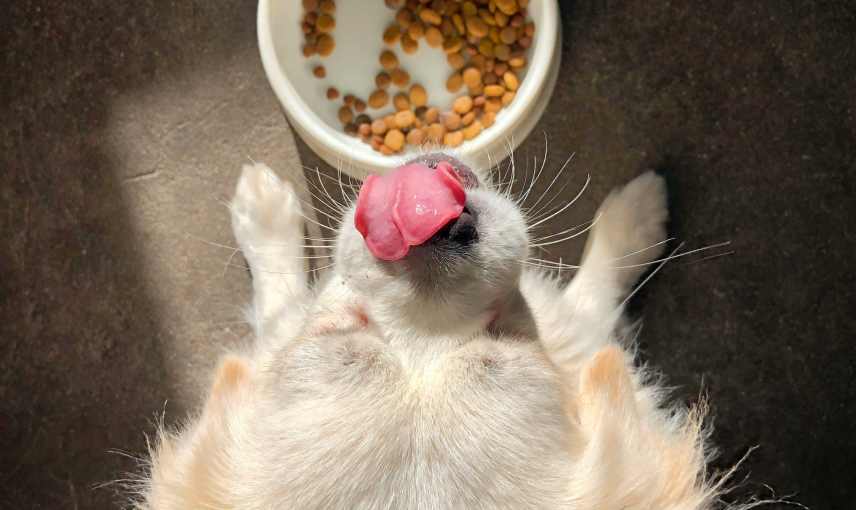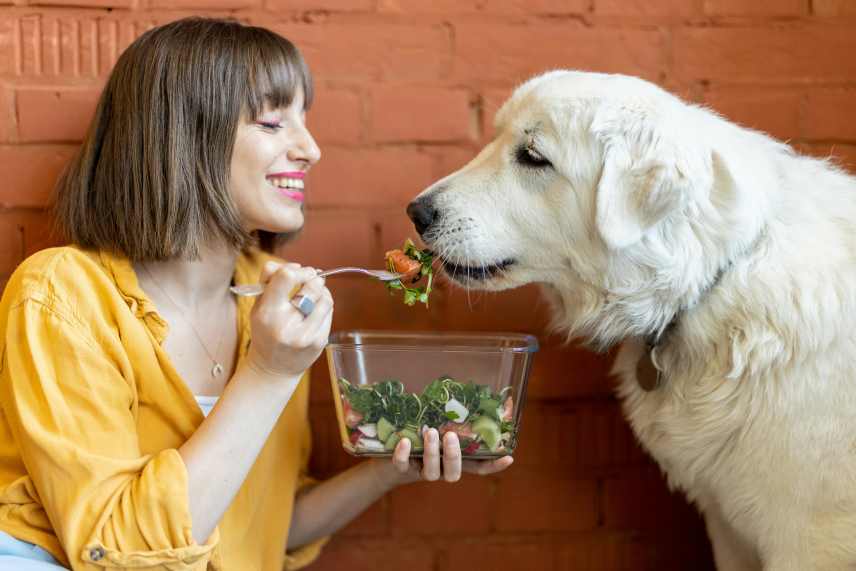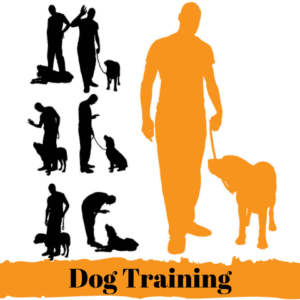As responsible pet owners, we always strive to provide our furry friends with the best care and nutrition. While dog food should be the primary source of sustenance for our beloved canines, did you know that there are some human foods they can enjoy as well? In this article, we’ll uncover ten surprising human foods that are not only safe but also beneficial for your four-legged companion.
From crunchy carrots and nutrient-packed blueberries to protein-rich eggs and lean meats, you’ll be surprised at the variety of foods that can supplement your dog’s diet. Not only do these foods provide a tasty treat for your pooch, but they also offer a range of health benefits, from boosting their immune system to aiding digestion.

It’s important to keep in mind that moderation is key. While these human foods are safe for dogs in small quantities, it’s essential to avoid overfeeding or introducing any foods that may be harmful to them. Always consult with your veterinarian before making any changes to your dog’s diet.
So, let’s dive in and discover the tasty and nutritious human foods that your dog can safely enjoy – besides their regular dog food.
Human foods that are safe for dogs – An overview
When it comes to feeding our dogs, it’s crucial to choose foods that are safe and nutritious. While there are many human foods that can be harmful to dogs, there are also several that are safe for them to enjoy. These foods can provide a variety of health benefits and add some excitement to your dog’s diet.
One of the essential considerations when introducing human foods to your dog’s diet is ensuring that they are safe and free from any harmful substances. It’s also important to remember that dogs have different nutritional needs than humans, so these foods should be offered in moderation, as an occasional treat or supplement to their regular dog food.
In the following sections, we’ll explore ten surprising human foods that are safe and beneficial for dogs, from lean meats and fruits to dairy products and grains. But always remember, moderation is key!
Lean meats – A healthy protein source for dogs
Protein is an essential nutrient for dogs, as it helps support muscle growth, repair tissues, and maintain a healthy immune system. While most of a dog’s protein intake should come from their regular dog food, lean meats can be a safe and healthy addition to their diet.
Lean meats such as chicken, turkey, and lean cuts of beef are excellent sources of high-quality protein for dogs. When preparing meats for your dog, it’s important to remove any skin, bones, or excess fat, as these can be harmful to their digestive system. Cook the meat thoroughly, without any seasoning or spices, to ensure it is safe for your dog to consume.
Feeding your dog small portions of lean meats can provide them with a variety of essential amino acids and nutrients. These meats can be served boiled, baked, or grilled, without any added oils or seasonings. Remember to let the meat cool down before offering it to your dog, and always ensure that it is fresh and free from any contaminants.
Fruits and vegetables – Nutritious options for dogs
Fruits and vegetables are not only packed with essential vitamins and minerals, but they can also be a tasty and healthy addition to your dog’s diet. However, it’s important to note that not all fruits and vegetables are safe for dogs to consume. Some can be toxic or cause digestive issues, so it’s crucial to choose wisely.
Carrots are a popular choice when it comes to dog-friendly vegetables. They are low in calories and high in fiber, making them an excellent option for dogs that need to manage their weight. Carrots are also great for dental health, as they can help clean your dog’s teeth and reduce the risk of dental problems.
Blueberries are another safe and nutritious fruit for dogs. They are packed with antioxidants, which can help boost your dog’s immune system and promote overall health. Blueberries are also low in calories and high in fiber, making them a great choice for dogs that need to maintain a healthy weight.
Other safe fruits and vegetables for dogs include apples (without seeds or core), bananas, green beans, and sweet potatoes. Always remember to wash and prepare these fruits and vegetables properly before offering them to your dog. Remove any pits, seeds, or skin that may be harmful, and cut them into small, bite-sized pieces for easier digestion.
Dairy products – Safe options for dogs in moderation
Dairy products can be a tasty and nutritious addition to your dog’s diet, but it’s important to offer them in moderation. While some dogs can tolerate dairy products without any issues, others may be lactose intolerant and experience digestive upset. Always monitor your dog’s reaction when introducing dairy into their diet and consult with your veterinarian if you have any concerns.
Yogurt is one dairy product that can be safe and beneficial for dogs. It is a good source of calcium and protein, and it contains probiotics that can help promote a healthy digestive system. When choosing yogurt for your dog, opt for plain, unsweetened varieties without any added flavors or sweeteners. Avoid yogurts with artificial sweeteners, as these can be toxic to dogs.
Another dairy product that some dogs can enjoy is cheese. Cheese can be a good source of protein and calcium, but it should be offered in moderation due to its high-fat content. Some dogs may also be lactose intolerant, so it’s important to monitor their reaction and adjust the amount accordingly. Offer small pieces of cheese as an occasional treat or use it as a training reward.
When introducing dairy products to your dog’s diet, start with small amounts and observe how they react. If you notice any signs of digestive upset, such as diarrhea or vomiting, discontinue the dairy and consult with your veterinarian.
Grains and cereals – A source of energy for dogs
Grains and cereals can provide dogs with a source of energy and essential nutrients. However, it’s important to choose whole grains and cereals that are safe and free from any harmful additives. When selecting grains for your dog, opt for whole grains such as brown rice, oatmeal, and quinoa.
Brown rice is a safe and nutritious grain for dogs. It is a good source of carbohydrates and provides fiber, vitamins, and minerals. Brown rice can be easily cooked and mixed with your dog’s regular dog food to add some variety to their diet. It’s important to cook the rice thoroughly and avoid adding any seasonings or spices that may be harmful to your dog.
Oatmeal is another safe and healthy grain option for dogs. It is a good source of fiber and can help regulate digestion. Oatmeal can be cooked with water or low-sodium broth and served as a treat or mixed with your dog’s regular dog food. Avoid using instant oatmeal or oatmeal with added sugars or flavorings, as these can be harmful to your dog.
Quinoa is a gluten-free grain that is safe and beneficial for dogs. It is high in protein, fiber, and essential amino acids. Quinoa can be cooked and served as a side dish or mixed with your dog’s regular dog food. Ensure that the quinoa is thoroughly cooked and cooled before offering it to your dog.
When introducing grains and cereals to your dog’s diet, start with small amounts and monitor how they react. Some dogs may have difficulty digesting certain grains, so it’s important to observe their response and adjust their diet accordingly.
Eggs – A protein-packed treat for dogs
Eggs are a protein-packed treat that can provide dogs with a range of essential nutrients. They are an excellent source of high-quality protein, vitamins, and minerals, including vitamin B12 and selenium. Eggs can be cooked and served as a treat or mixed with your dog’s regular dog food.
When preparing eggs for your dog, it’s important to cook them thoroughly to eliminate the risk of salmonella. Avoid using any seasoning or spices, as these can be harmful to your dog. You can cook eggs by boiling, poaching, or scrambling them without any added oils or fats.
Some dogs may be allergic to eggs, so it’s important to monitor their reaction when introducing eggs to their diet. Start with a small amount and observe any signs of digestive upset or allergic reactions. If your dog shows any adverse reactions, discontinue the eggs and consult with your veterinarian.
Peanut butter – A tasty and nutritious snack for dogs
Peanut butter is a popular treat for dogs, and it can be a tasty and nutritious addition to their diet. It is a good source of protein and healthy fats, and most dogs absolutely love the taste. However, it’s important to choose the right kind of peanut butter and offer it in moderation.
When selecting peanut butter for your dog, opt for natural varieties without any added sugars, salt, or artificial sweeteners. Some peanut butter brands contain xylitol, which is highly toxic to dogs. Always read the label carefully and ensure that the peanut butter you choose is safe for your dog.
Peanut butter can be served as a treat or used as a filling for Kong toys or puzzle feeders. It can also be used as a training reward or mixed with your dog’s regular dog food to add some flavor and excitement. Remember to offer peanut butter in moderation, as it is high in calories and fat.
Fish – A great source of omega-3 fatty acids for dogs
Fish is an excellent source of omega-3 fatty acids, which are essential for your dog’s overall health and well-being. Omega-3 fatty acids can help support a healthy coat and skin, promote joint health, and boost the immune system. When it comes to feeding fish to your dog, it’s important to choose the right kind and prepare it properly.
Salmon is a safe and beneficial fish for dogs. It is rich in omega-3 fatty acids and provides a range of essential nutrients. Salmon can be served cooked or raw, but it’s important to ensure that it is fresh and free from any contaminants. Avoid using any seasoning or spices, as these can be harmful to your dog.
Other safe fish options for dogs include sardines, mackerel, and whitefish. These fish are also rich in omega-3 fatty acids and can be served cooked or canned in water. Ensure that the fish is boneless and free from any added sauces or seasonings.
When introducing fish to your dog’s diet, start with small portions and observe how they react. Some dogs may have allergies or sensitivities to certain types of fish, so it’s important to monitor their response and adjust their diet accordingly.
Foods to avoid – Human foods that are dangerous for dogs
While there are many human foods that are safe and beneficial for dogs, there are also several that can be harmful or even toxic to them. It’s important to be aware of these foods and avoid feeding them to your dog to prevent any health issues or emergencies.
Some of the foods that are dangerous for dogs include chocolate, caffeine, grapes and raisins, onions and garlic, avocados, alcohol, and xylitol (an artificial sweetener). These foods can cause a range of health issues, from digestive upset and pancreatitis to organ failure and even death.
It’s important to keep these foods out of your dog’s reach and ensure that they are not accidentally ingested. If you suspect that your dog has consumed any of these foods or if they show any signs of illness or distress, contact your veterinarian immediately.
Related articles:
What Foods Are Toxic To Dogs
How Much Chocolate Is Toxic To Dogs
Can Dogs Get Food Poisoning?
Conclusion – what can my dog eat besides dog food
As responsible pet owners, it’s our duty to provide our dogs with a balanced and nutritious diet. While dog food should be the primary source of sustenance for our furry friends, there are some human foods that can safely supplement their diet and provide a range of health benefits.
From lean meats and fruits to dairy products and grains, there are several surprising human foods that are safe and beneficial for dogs. However, it’s important to remember that moderation is key. These foods should be offered in small quantities, as an occasional treat or supplement to their regular dog food.
Always consult with your veterinarian before making any changes to your dog’s diet, especially if they have any underlying health conditions or dietary restrictions. Your veterinarian can provide guidance on the appropriate portion sizes and help you choose the right foods for your dog’s specific needs.
By providing a variety of safe and nutritious human foods in moderation, you can add some excitement to your dog’s diet and ensure that they receive the essential nutrients they need for a healthy and happy life. Remember,’s our duty to provide our dogs with a balanced and nutritious diet. While dog food should be the primary source of sustenance for our furry friends, there are some human foods that can safely supplement their diet and provide a range of health benefits.
From lean meats and fruits to dairy products and grains, there are several surprising human foods that are safe and beneficial for dogs. However, it’s important to remember that moderation is key. These foods should be offered in small quantities, as an occasional treat or supplement to their regular dog food.
Always consult with your veterinarian before making any changes to your dog’s diet, especially if they have any underlying health conditions or dietary restrictions. Your veterinarian can provide guidance on the appropriate portion sizes and help you choose the right foods for your dog’s specific needs.
By providing a variety of safe and nutritious human foods in moderation, you can add some excitement to your dog’s diet and ensure that they receive the essential nutrients they need for a healthy and happy life. Remember, a well-balanced diet is key to keeping your furry friend thriving!
5 Nutritious and Delicious Alternatives to Dog Food: Discover the Best Meals to Feed Your Furry Friend!

Feeding your furry friend nutritious and delicious meals doesn’t have to be a daunting task. By considering alternatives to traditional dog food, you can provide your pup with a wide variety of flavors and nutrients that will keep them happy and healthy.
Continue reading: 5 Nutritious and Delicious Alternatives to Dog Food
Wholesome Bowls: 5 Tail-Wagging Homemade Dog Food Recipes

Here are five homemade dog food recipes tailored to provide balanced nutrition for your beloved pet. Remember to consult with a veterinarian or a canine nutritionist before making any significant changes to your dog’s diet, especially if your dog has specific health conditions or dietary needs.
Continue reading: 5 Tail-Wagging Homemade Dog Food Recipes
